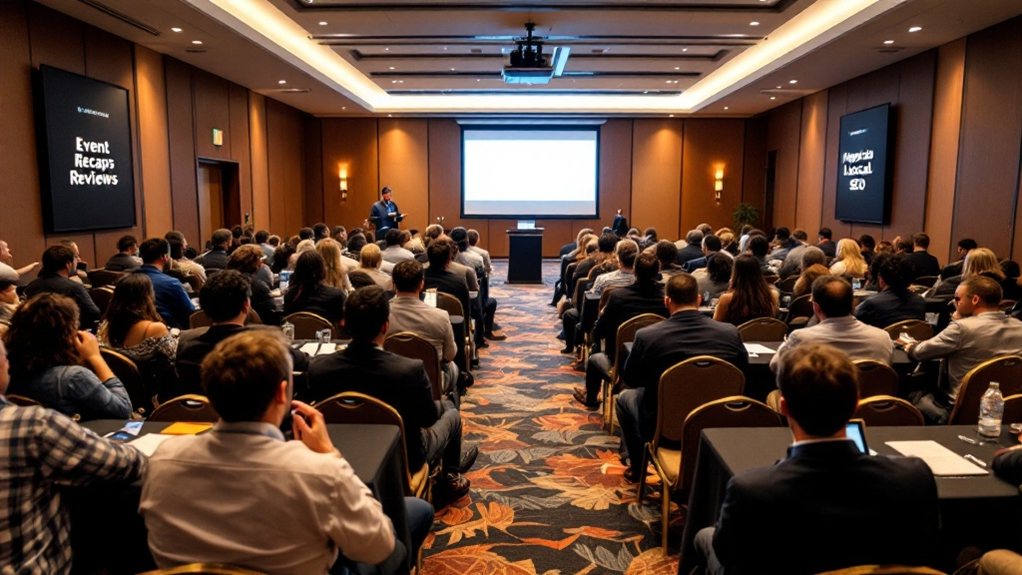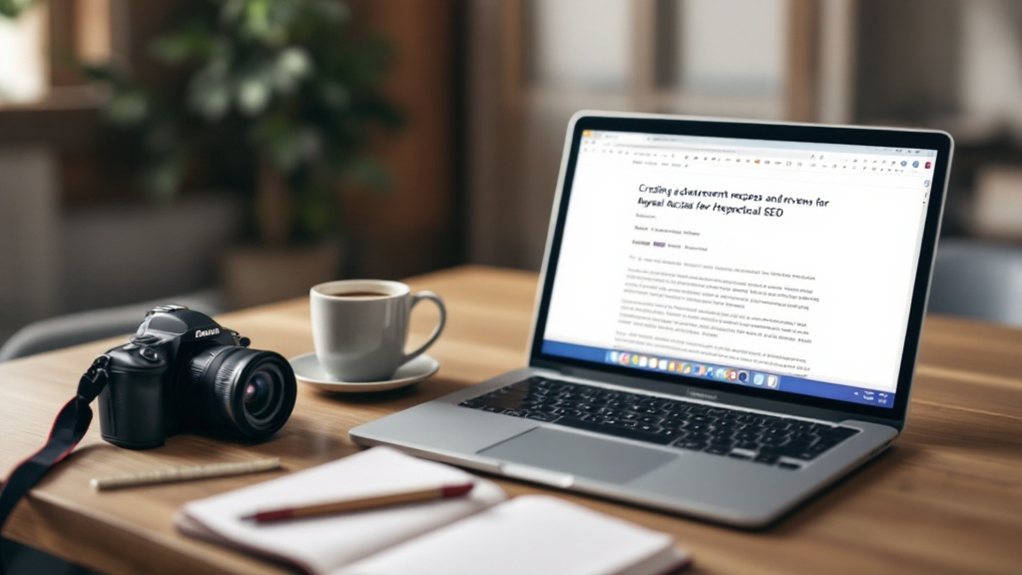As a local business or event organizer, crafting compelling event recaps and reviews can boost your hyperlocal SEO and connect with your community. Incorporate key details, leverage local content, and optimize for mobile and voice search to create content that resonates with your target audience. Strategies like local link building, leveraging event schema markup, and using multimedia can take your event recaps to the next level. Continue reading to discover more impactful tips.
Key Elements of Effective Event Recaps

When crafting effective event recaps, you'll want to focus on capturing the key details that give readers a comprehensive understanding of the occasion. Start by including the event's date, location, and type to provide essential context. Highlight the attendee feedback, mentioning the number of participants and their reactions to enhance credibility. Discuss the speakers, performers, and their contributions, as well as any engaging sessions or activities that took place. Event planning focuses on creating memorable experiences for attendees. Finally, summarize the event's overall impact and the key takeaways. By incorporating these elements, you can create a compelling and informative event recap that resonates with your audience.
Incorporating Hyperlocal Content

To effectively leverage hyperlocal content for your event recaps, you'll want to incorporate specific location-based keywords throughout your writing. Use neighborhood or community names to highlight relevance, and optimize meta tags, titles, and URLs accordingly. Focus on “near me” or “in [specific location]” phrases, drawing from keyword research tools. Craft content centered around local events and news, highlighting nearby landmarks and engaging the local audience through storytelling. Involve local figures, encourage user-generated content, and partner with nearby businesses to enhance community engagement. Aligning your content with local search intent is crucial, ensuring mobile-friendliness, and measure success through metrics like organic traffic and local search rankings.
Strategies for Local Link Building

Building a strong local link profile is crucial for effective hyperlocal SEO. One powerful strategy is to collaborate with local media and bloggers. Guest post on their sites, encourage reviews, and become a regular columnist. Additionally, sponsoring local events, supporting charities, and joining business organizations can earn valuable backlinks. Local link building can also be an effective way to drive qualified leads. Consider creating case studies, event recaps, and visual content to attract links from the local community. The key is to build genuine relationships and provide value to your audience.
| Local Link Building Strategies | |||
|---|---|---|---|
| Guest Blogging | Local Sponsorships | Charity Support | Local Columnist |
| Event Recaps | Case Studies | Hyperlocal Roundups | Local Partnerships |
Optimizing for Mobile Experiences
As mobile devices continue to dominate the digital landscape, optimizing for mobile experiences has become crucial for businesses aiming to engage with their local audience. Responsive web design ensures consistent user experiences across devices, while page speed optimization reduces load times. Touch-friendly navigation and mobile-friendly forms enhance usability, while AMP implementation provides a lightning-fast mobile experience. Smooth navigation, fast load times, and easy access to information are essential for reducing bounce rates and increasing engagement. Utilizing responsive technologies, mobile-optimized content, and regular testing are technical requirements for a successful mobile strategy. Aligning content with voice search and incorporating user-generated content can further strengthen your hyperlocal SEO performance.
Leveraging Event Schema Markup
Enhancing visibility for your event listings is crucial. Implement event schema markup to showcase key details like date, location, and ticket availability directly in search results. Additionally, consider using rating schema to build credibility and trust with potential attendees. [Schema markup provides context to information so that search engines know what content on a web page means.
Enhance Visibility With Event Schema
How can you leverage event schema markup to enhance your visibility in search engine results? Implementing event schema improves your listings' appearance through rich results, displaying key details like event dates and locations. This increases your click-through rate by providing more information upfront. The enhanced visibility from rich results can drive higher organic traffic from search engines. Event schema also optimizes your content for voice search. Structured data in SEO is pivotal for the e-commerce sector. Schema markup gives you control over your brand's representation, preventing AI misinterpretations. Validate your schema using Google's testing tools, and leverage structured data to boost your local SEO competitiveness.
Credibility Through Rating Schema
Leveraging event schema markup can further boost your credibility by enabling the display of ratings and reviews in search engine results. Schema markup directly influences how a business appears in search results, improving click-through rates and rankings. Review schema allows for the presentation of real user feedback, adding authority and trust to your event listings. By showcasing aggregated ratings and reviewer details, you can attract more attendees and increase click-through rates. This structured data approach aligns with search engine algorithms, ensuring your events are presented as reliable sources of information. Complementing your event details with review schema contributes to a holistic, credible online presence, ultimately enhancing your visibility and reputation within your local community.
Responding to Reviews and Feedback
Responding effectively to reviews and feedback should be a top priority for businesses aiming to bolster their local online presence. Reviews significantly impact search rankings and credibility, so addressing them in a timely and personalized manner is crucial. Leveraging local reviews and testimonials can further enhance your local visibility and credibility.
When addressing negative reviews, be sure to:
- Address specific concerns mentioned.
- Remain professional and appreciative.
- Highlight positive reviews on your website.
Consistent, thoughtful responses can mitigate the impact of negative reviews and demonstrate your commitment to the community. Monitoring review metrics and incorporating feedback into your overall SEO strategy will further enhance your local visibility and credibility.
Highlighting Local Sponsors and Participants
Highlighting the local businesses that sponsor your event is a great way to showcase your community involvement. Recognizing the participation of prominent community members can also lend credibility to your event. Strategically featuring these local connections in your event content can provide a significant boost to your hyperlocal SEO efforts. Highlighting these local connections in your event recap blog post can help establish your business as an active and engaged member of the community.
Spotlight Local Businesses
When you spotlight local businesses in your event recaps, you can unlock a wealth of benefits for your community. These businesses gain increased visibility, fostering brand recognition and strengthening community engagement. Additionally, corporate sponsorships contribute to a 20% boost in local retail sales, providing an economic lift. Notably, event networking opens up valuable partnership opportunities and tax benefits, empowering businesses to thrive. By highlighting the roles of local sponsors – whether through financial sponsorship, in-kind donations, or media promotions – you amplify their brand presence and community pride. Leveraging these strategies can significantly impact your local economy, fueling job creation, infrastructure improvements, and tourism.
Recognize Community Involvement
Recognizing the invaluable contributions of local sponsors and participants is crucial for the success of your event. Involving the community not only fosters a sense of ownership but also enhances engagement through volunteer opportunities and skill-building programs. Highlighting local sponsors reinforces partnerships and promotes mutual support within the community. Events also showcase local culture and heritage, preserving traditions for future generations. Furthermore, community dialogue is facilitated, allowing diverse perspectives to be shared openly. By recognizing the roles of local sponsors and participants, you can encourage future involvement and support, ultimately strengthening the event's impact and connection to the community.
Using Multimedia to Enhance Engagement
Multimedia content can breathe life into your event recaps and reviews, captivating your audience and boosting engagement. Incorporate high-quality photos, videos, and infographics to visually convey the energy and excitement of the event. These elements can:
- Improve blog post readability and engagement by breaking up text and providing visual interest.
- Offer a more immersive experience, allowing readers to better understand the event.
- Visually summarize key statistics or highlights, making complex information easier to digest.
Pair multimedia with optimized metadata and mobile-friendly design to ensure your content is discoverable and accessible across devices. By leveraging the power of multimedia, you can create compelling event recaps that drive traffic and foster community engagement.
Structuring Content for Readability
Craft compelling event recaps and reviews with clear, scannable headings. Organize information in a logical flow to keep readers engaged. Optimize your content for mobile viewing to reach your local audience.
Clear Headings for Scanability
As a writer, the clarity and structure of your headings are crucial for creating scannable content that resonates with your readers. Clear and consistent headings provide an intuitive information hierarchy, guiding users through your content efficiently. When crafting headings, focus on:
- Meaningful Titles: Avoid vague or clever phrasing; opt for concise, descriptive headings that convey the main idea.
- Consistent Formatting: Maintain a consistent style across headings and subheadings to aid scanning.
- Visual Variation: Leverage font size and styling to highlight important sections and enhance scannability.
Scannable headings improve the user experience, boost engagement, and can indirectly benefit your SEO efforts by enhancing accessibility and content quality.
Organize With Logical Flow
Structuring content with a logical flow is crucial for enhancing the readability and user experience of your writing. Utilize shorter sentences to improve comprehension, and vary their length to maintain reader interest. Organize ideas within clear paragraph structures, dividing complex information into manageable segments. Employ transition words to guide readers through the narrative, improving coherence and flow. Consistently maintain the tone and style to build trust and focus. Leverage active voice to create more engaging sentences, and incorporate visuals and white space to boost reading comprehension. By prioritizing logical organization, you'll create content that's easy to navigate and understand.
Optimized for Mobile Viewing
When optimizing content for mobile viewing, structuring the information with readability in mind is crucial. Crafting short, scannable paragraphs, incorporating visually appealing elements like bullet points, and ensuring key highlights are emphasized through headings will make your content more engaging and accessible on smaller screens. Consider these three important factors:
- Leverage Formatting: Use concise language, group related information, and strategically place headlines to guide readers.
- Enhance Legibility: Choose appropriate font sizes, increase line spacing, and maintain consistent typography for easy reading.
- Prioritize Relevance: Organize content to prioritize the most important details and reduce unnecessary distractions.
Measuring the Impact of Event Recaps
Measuring the impact of event recaps is crucial for understanding their effectiveness and informing future event planning. Utilize Google Analytics to track increased website traffic to event-related pages. Monitor social media engagement through likes, shares, and comments. Analyze metrics like average time spent on the site and bounce rates. Review referral traffic from other channels to gauge awareness. Measure conversion rates, such as form fills or purchases, to assess the recaps' influence on desired actions.
Evaluate the recaps' contribution to SEO by tracking keyword rankings, schema markup, and local optimization. Analyze lead generation, revenue, and cost data to determine the event's return on investment. Leverage post-event summaries, historical analysis, and competitor benchmarking to refine your strategies for future events.
